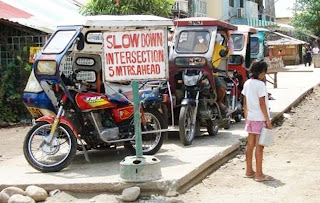By ALFREDO P HERNANDEZ
LARAP, the second biggest baranggay in terms of population after Parang, is feeling the neglect it says it does not deserve under the road cementing initiative around the municipality of Jose Panganiban.
And the natives of the place who bundled themselves under the 'Taga Larap Ako' account on Facebook are coming in full force as they began agitating for more attention and action from the municipal government - which simply means that the administration of Mayor Ricarte Padilla should start looking west that is Larap and do something about the terrible condition of the road linking it to the town.
During its heyday as a mining community under the banner of the Philippine Iron Mines (PIM) then considered the biggest iron mines in the Philippines, the municipality enjoyed substantial tax revenue from the mines hosted by Larap.
And yet, the road that linked it to the fringes of the town starting from Parang, had never been paved and remained a road that only mining communities deserve - rough and bumpy.
One reason was that, hundreds of trucks used this stretched to haul iron ore mined at three sites in Paracale, a neighboring town, which were the barrios of Pinagbirayang Munti, Dagang and Agusan.
The haul was brought to Larap for further processing into pellets for shipment to Japan in Japanese vessels that awaited at Calabayungan Island, just a stone's throw away from the playground by the water.
Just imagine the stress from the weight of tons of iron ore would do on a concrete road as envisioned for Larap. The cost would be high and unsustainable in the long run.
That's why the JP-Larap road has been kept to what it is until these days, just giving it the retouch once in a while especially after heavy rains, just to keep it passable.
Another reason was that we did not know what happened to the tax money supposed to help improve the state of the road to the mining community during its boom days.
Meanwhile, road paving or cementing was carried out by the recent previous administrations, up to that of Ricarte's.
The good news is that the initiative began showing ribbons of concrete roads on the fringes of the town bordered by Parang and Santa Rosa to the south and Bagong Bayan in the north, towards San Mauricio.
As of last May when I was on few-day sojourn in Parang for my annual holiday, I saw that the concrete had already reached a few meters past the Ermita (Parang chapel) but before turning a curb to the left. But it covered only the half lane.
"Cement and gravel had run out ..." said Kagawad Tabuada during our long chat at the auditorium of the JPNHS. I first noticed the road project and was impressed a bit, urging me look for the man in charge.
"That's why we have launched a community program that would involve OFWs from this town by helping us raise the materials to continue building the road.
Bad road is bad for vehicles, especially on the transport that shuttles people and goods thru and fro between Larap and Jose Panganiban. Travel is always slow, dirty and often puts the vehicle at a great stress, making maintenance the biggest hole-burner in the pocket of the operators.
When I drove up to Larap last Easter Sunday to take my youngest niece to her Lola and Lolo (parents of Theody Francisco, who is based in Saudi these days, and married to my youngest sister Lourdes), I was as stressed up as our car. I need not describe how the drive was, but the car groaned and clanked as it negotiated the road onwards.
In a unique outburst of solidarity as they have been since way back in the 50s, 60s and 70s - obviously one clear effect of bussing them from Larap to JPHS and back on Alatco buses, wherein they developed close camaraderie and unity during the 30-minute ride - the members of the 800 plus strong Larap PIM Association (LaPIMA) - had started the ball rolling of helping their beloved community - by mobilizing its "abroad" members to help chip in for funds and materials so that their community could be linked to the poblacion with a decent road - a cemented one.
But first they have to find out if such money, when eventually raised, would do the trick, aware that unsupervised funds (by their own people) could become like a wayward tricycle that could derail the whole project.
Faceboook photo postings by the members of "Taga Larap Ako" (TLA) showed portions of Larap roads in deplorable condition, that one FBooker, apparently overseas, said something like: "Ay! ano ba yan, bata pa ako, ganito na ang kalsada natin... ganito pa rin pala hanggang ngayon ..."
We, in Parang - being near the kitchen so to speak and therefore could catch the heat of the action - have nothing to complain about. So far.
The sandy road in front of our ancestral home that ends in front of the central gate of JPNCS has been concreted. Hurray!
Sometimes, isolation is one big hindrance to progress.
That's the devil that's giving Larap its hell.




No comments:
Post a Comment